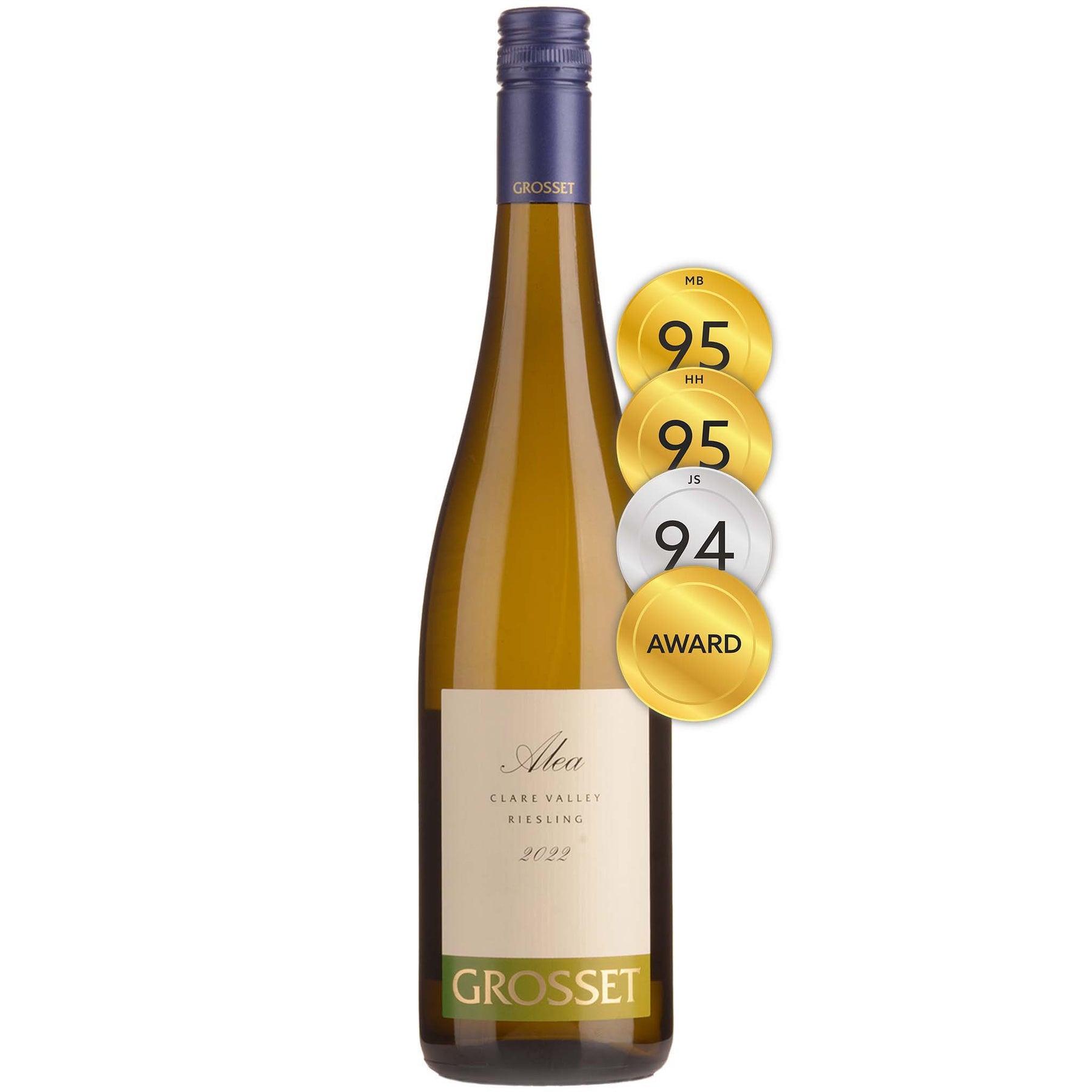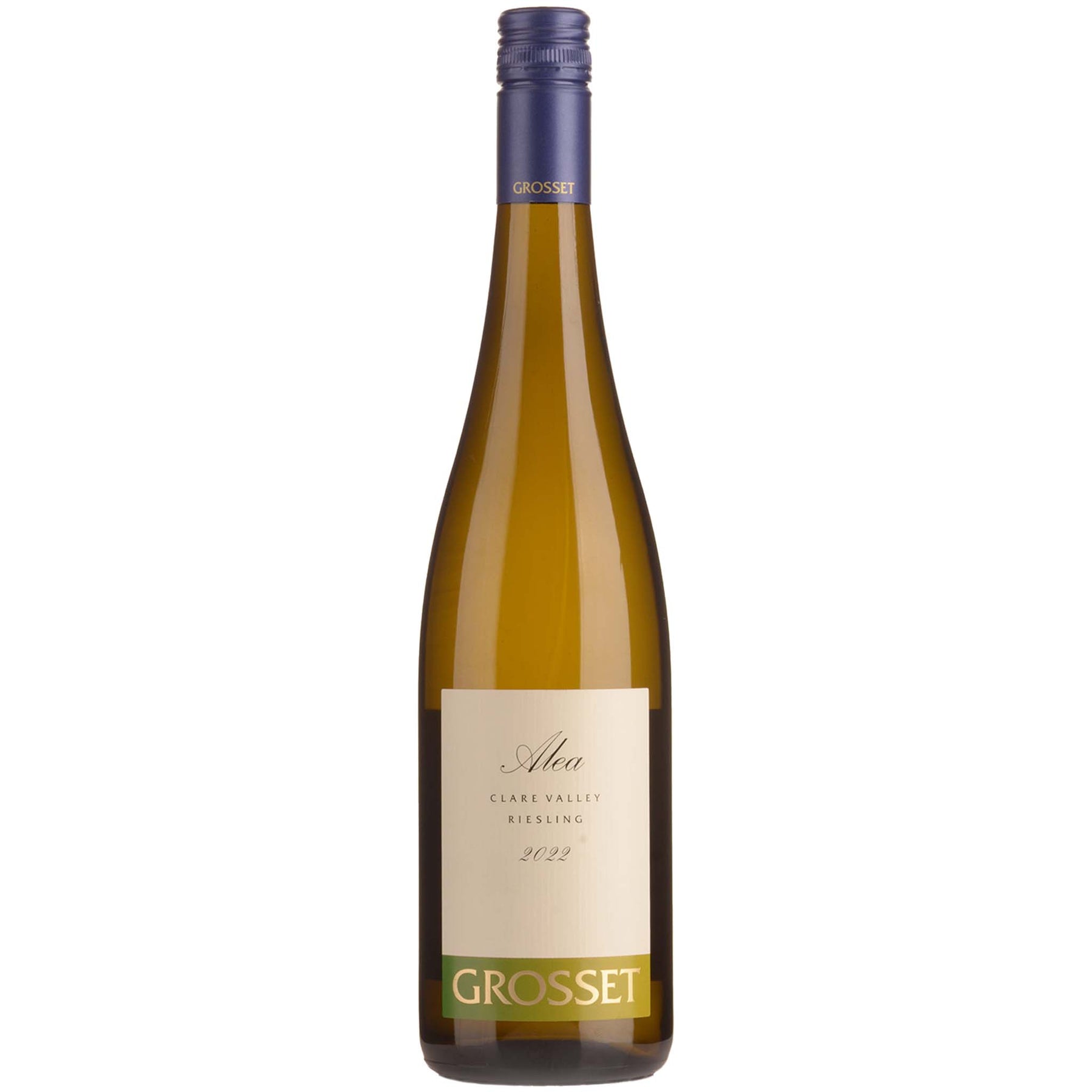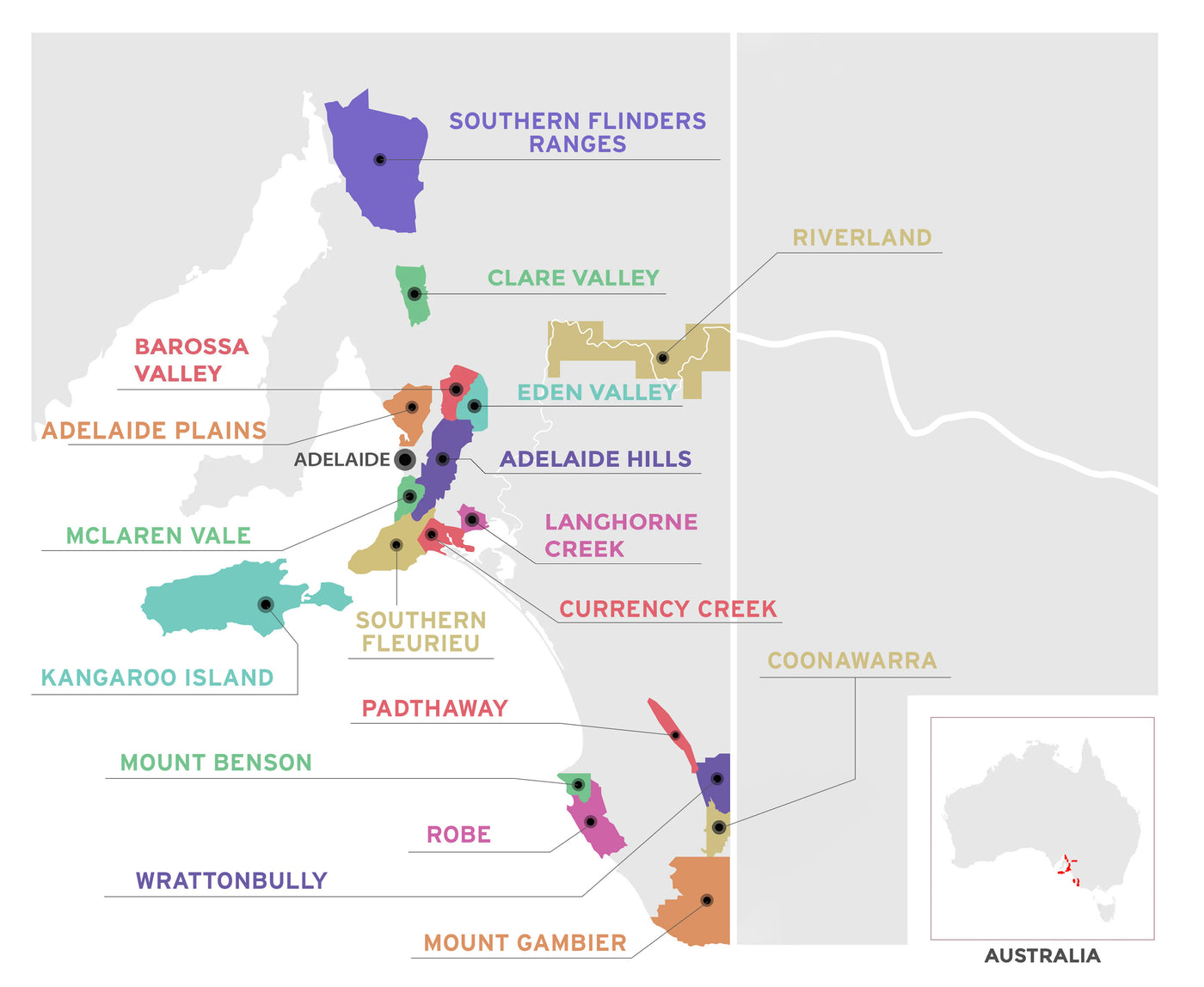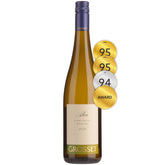

Grosset Alea Riesling 2022
Style: White Wine
Variety: Riesling
Closure: Screwcap
Grosset Alea Riesling 2022
Warehouse
34 Redland Drive
Vermont VIC 3133
Australia
Critic Score: 95
Alcohol: 12.5%
Size: 750 ml
Drink by: 2035
The 10 Best Rieslings to Buy Right Now, From California to Australia - Robb Report
The Grosset Alea Riesling is the most recent of the Grosset Rieslings. It is an off-dry riesling made in the style of the rieslings of Germany and Austria. The fruit comes from the Alea Vineyard, which constitutes a narrow section of the larger Rockwood Vineyard, planted in 2000. The wine was first released in 2010 as Grosset Off-dry Riesling, but was renamed Grosset Alea Riesling in 2012.
"Pale colour, the aromas fresh and leaping from the glass with honey and sweet citrus blossom aromas, a glorious nose! The palate is delicate and refined, subtle, just faintly off-dry, with a touch of richness in the middle. Clean and long finish: lovely wine." Huon Hooke
While the adjacent Grosset Springvale Vineyard is a soft rock site of red loam over limestone, the Alea Vineyard is a hard rock site and the resultant wines are distinctly different. The Alea Riesling has lemon juice and lime pith aromatics, a generosity of lime juice flavours, and a touch of sweetness on the back palate balanced by refreshingly powerful natural acidity. It is a delicate, fine riesling suited to being consumed alongside food with robust spicy flavours.
"The 2022 Alea is a landmark Grosset vintage: complex, taut, pure and balanced. The unique characteristics of the Alea vineyard site have been exquisitely captured by a European winemaking approach. It has pristine lemon lime aromatics which entice. These are enhanced by a mouth-puckering intense palate which exhibits both finesse and power and a long and satisfying, chalky finish. Ageing potential: Drink now–20 years. Produced from riesling grown at the Grosset Rockwood Vineyard, an A-Grade Certified Organic and Biodynamic (ACO) vineyard." Grosset
Expert reviews
"Grapes for this fascinating Riesling are grown in the ACO certified organic Grosset Rockwood Vineyard in Clare Valley, Australia. The wine has aromas of dried savory herbs, white citrus blossoms and lime zest. It has flavors of tangerine peel, grapefruit pith and lemon zest and a strong current of minerality with a finish that just goes on and on." Robb Report - The 10 Best Rieslings to Buy Right Now, From California to Australia
"Alea Vineyard, a distinct site for Grosset set on red loam over hard-red rock, was planted in 2000. Certified organic and biodynamic. Produced in an off-dry style. A moreish riesling with pitch-perfect sweetness and acidity, mouth-watering and fresh in its feel. Scents of green apple, kaffir lime leaf and lemon lozenges. Flavours combine with the crunch and sweetness of green apple with a good squeeze of tangy lime juice. Gentle fruit sweetness is abetted by cool, briny, lemony acidity and general air of freshness. Ultra appealing and yet with a sense of detail and minerally complexity. An outstanding release which should develop with interest with cellar time. Drink by 2035." Mike Bennie, Halliday Wine Companion - 95 points
"Pale colour, the aromas fresh and leaping from the glass with honey and sweet citrus blossom aromas, a glorious nose! The palate is delicate and refined, subtle, just faintly off-dry, with a touch of richness in the middle. Clean and long finish: lovely wine. 8 grams per litre of sweetness. Drink 2022-2034." Huon Hooke, The Real Review – 95 points
"A strikingly harmonious dry Clare Valley riesling with aromas of licorice, fennel and lime zest. On the generous and vibrant palate there's also melon and herbal freshness. Harmoniously dry finish. From biodynamically grown grapes. Drink or hold. Screw cap." James Suckling, JamesSuckling.com - 94 points
Awards
The 10 Best Rieslings to Buy Right Now, From California to Australia - Robb Report
Alea (rockwood) vineyard
The Grosset Alea Vineyard comprises 15 rows of vines planted in 2000 in the higher altitude north-eastern corner of the Watervale subregion. It is a narrow 300 metre by 22 metre corridor of hard red rock with poor, orangey, red loam topsoil, that constitutes part of the larger Grosset Rockwood Vineyard. Alea is named after the Greek goddess of wisdom, courage and agriculture, Athena Alea.
The Alea Vineyard is adjacent to the Springvale Vineyard but its geology is very different, as are the resultant wines. While the Springvale Vineyard is a soft rock site of red loam over limestone, the Alea is a hard rock site and is viticulturally the more challenging.
The flavour of the first fruit off the Alea Vineyard reminded Grosset of great European rieslings which were not completely dry, so he subsequently adopted a more European approach to its making. The Alea Riesling has lemon juice and lime pith aromatics, a generosity of lime juice flavours, and a touch of sweetness on the back palate balanced by refreshingly powerful natural acidity. It is a delicate, fine riesling suited to being consumed alongside food with robust spicy flavours.

The four Grosset estate-owned vineyards
About Jeffrey Grosset

"Jeffrey Grosset wears the unchallenged mantle of Australia's foremost riesling maker. Grosset's pre-eminence is recognised both domestically and internationally." James Halliday
Grosset was 15 when his father, an electrician, came home with a bottle of wine and shared it with the family. It was riesling and Jeffrey was gobsmacked. So began the Grosset story. The following year Jeffrey enrolled at Roseworthy Agricultural College, completing an Agriculture degree in 1973 and an Oenology degree in 1975. At the age of 21 Jeffrey started work at Seppelt Great Western, before heading to a German winery with a 1000-tonne crush as assistant winemaker, only to find the chosen French winemaker had changed his mind, leaving Grosset in charge. He subsequently returned to Australia and worked at Lindeman's Karadoc winery with its 30,000-tonne crush. But ultimately he wanted to start his own label.
In 1981 Jeffrey purchased an old milk depot in the historic township of Auburn 1981 and established Grosset Wines. He produced four wines that vintage under his own label, 800 dozen bottles in total. Now, 42 years later, Grosset is regarded as arguably the best maker of riesling in Australia and produces nine wines and 11,000 bottles per vintage.
Grosset is not shy about challenging tradition and questioning accepted practices. In the late 1980s, he was the leader of a successful movement to only allow the use of the word Riesling on Australian wines that were made specifically from the Riesling grape. Until that point, a significant number of Australian wines with Riesling on their label were made from other grape varieties.
Grosset was also the driving force behind a decision in 2000 by Clare Valley Riesling producers to switch to screwcap closures for their wines and to encourage Australian and New Zealand winemakers to do the same, and for the public, retailers and media to embrace the change. He continues to privately fund research into the subject.
Next, he established the Grosset Gaia Fund, donating to charities supporting youth, the arts and the environment. Recently he has led the way for Australian winemakers to use blockchain technology for verification of product provenance, authenticity and seal integrity.
Jeffrey Grosset has received a great deal of local and international recognition for his winemaking. In 1998, he was the first recipient of "Australian Winemaker of the Year" from Gourmet Traveller Wine magazine and was named the "International Riesling Winemaker of the Year" at the Riesling Summit in Hamburg, Germany. He was nominated in 2005 as one of the world's "50 Most Influential Winemakers" by Wine & Spirits and in 2006, named as one of the "Top 10 White Winemakers" in the world by Decanter magazine.
Grosset's philosophy has remained steadfast over the years, the emphasis is on purity of fruit. The estate vineyards, which are ACO certified organic, are hand-tended and each bunch of grapes is harvested at optimum ripeness. The winemaking process is gentle and uncomplicated. With dedication, discipline and the application of knowledge garnered through decades of experience, the result is the finest expression of variety and place.

South Australia
South Australian is responsible for more than half the production of all Australian wine. It is home to more than 900 wineries across 18 wine regions. The regions are Adelaide Hills, Adelaide Plains, Barossa Valley, Clare Valley, Coonawarra, Currency Creek, Eden Valley, Kangaroo Island, Langhorne Creek, McLaren Vale, Mount Benson, Mount Gambier, Padthaway, Riverland, Robe, Southern Fleurieu, Southern Flinders Ranges and Wrattonbully.
Many of the well-known names in the South Australian wine industry established their first vineyards in the late 1830s and early 1840s. The first vines in McLaren Vale were planted at Reynella in 1839 and Penfold's established Magill Estate on the outskirts of Adelaide in 1844.
South Australia has a vast diversity in geography and climate which allows the State to be able to produce a range of grape varieties - from cool climate Riesling in the Clare and Eden Vallies to the big, full bodied Shiraz wines of the Barossa Valley and McLaren Vale. Two of Australia's best-known wines, Penfolds Grange and Henschke Hill of Grace, are produced here. There is much to discover in South Australia for the wine lover.


